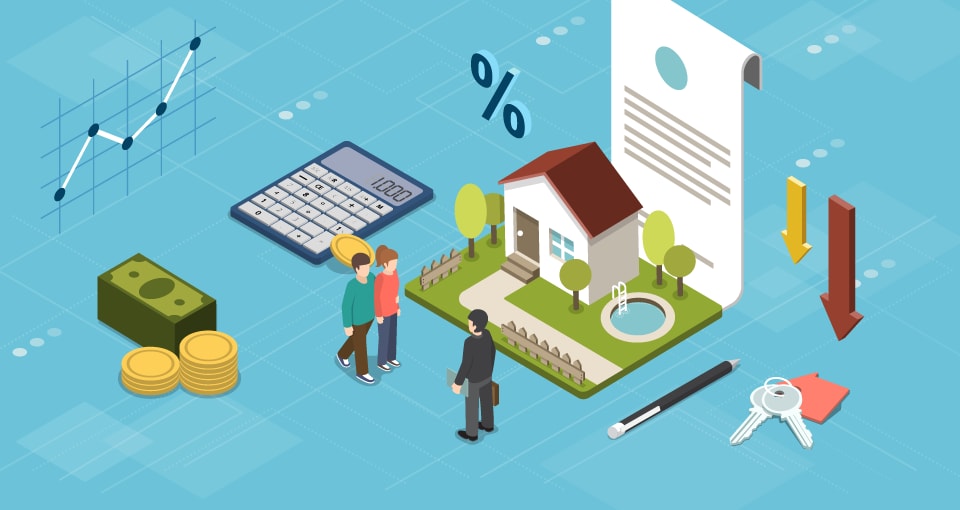As per a report by a leading real estate firm, the home loan market was valued at Rs. 11.5 trillion in March 2020. This marked growth at a 16% CAGR over the previous 6 years.
Housing Finance Companies (HFCs) have been a key player in this development. As per the National Housing Bank, of the 100 HFCs in India, 76 have reported a 21% growth between September 2018 and January 2020.
Housing loans have become comparatively easier to avail for home buyers, and the above data suggest the same. Lenders also have simplified the eligibility criteria and paperwork to reduce the processing time. However, it is your responsibility to Compare Home Loans from different lenders and check which one is most favorable for you.
Here are a few points to know for those looking for a housing loan –
Table of Contents
The loan will be a discounted amount of the property price
The housing loan amount a borrower receives is based on LTV or loan to value ratio. It is the ratio between the loan amount and a property’s value. The LTV helps lenders recover the debt in case a customer defaults.
For example, an 80% LTV means the principal will be 80% of a property’s current market price.
LTV can depend on several factors like property valuation, the borrower’s income, occupation, etc. However, it is primarily mandated by the Reserve Bank of India.
RBI sets the LTV based on the loan amount –
- Up to Rs.30 lakh – 80% to 90%.
- Between Rs.30 lakh and up to Rs.75 lakh – Up to 80%.
- Rs.75 lakh and above – Up to 75%.
As an LTV is never 100%, customers will have to invest from their own funds, which is also known as a down-payment.
Also Read: How Technology Helps Businessmen to Forecast their Revenue
Borrowers will mandatory have to make a down-payment
Experts advise borrowers to make a minimum down-payment of 20% when opting for a home loan.
By increasing the margin and lowering the LTV, customers may be able to secure lower home loan rates. Additionally, making a higher down-payment lowers the principal, which reduces the cost of loan and helps a borrower save on interest.
A high CIBIL score is crucial when applying
Even though housing loans are collateralised loans, lenders prefer customers with a high CIBIL score. A good score lowers the risk involved since these credits are of high value.
Ideally, 750 is the minimum CIBIL score for a home loan that financial institutions require an applicant to hold.
Lenders give preference to those with low FOIR
Fixed Obligation to Income Ration (FOIR) or debt-to-income ratio is the ratio between an applicant’s fixed monthly liabilities to his/her income. The ideal ratio that lenders prefer is 50% or less.
A lower ratio ensures a borrower can pay the housing loan EMIs more comfortably since these can be high.
FOIR and CIBIL score are two of the factors that may impact the home loan interest rate. Applicants will also be able to secure the best home loan offers by holding a good score and a low debt-to-income ratio.
The loan tenor affects the EMIs and cost of loan
Housing loan tenors can range up to 20 years. A prolonged period makes repayment easier by making the EMIs affordable since the principal is high.
However, longer tenors will increase the cost of loan (principal + interest). Borrowers will end-up paying more interest in the long run. On the other hand, a shorter tenor will have the opposite impact.
For example, consider a housing loan of Rs.55 lakh with a rate of interest of 9%. Now, the EMIs and cost of loan for different tenors will be –
- 20 years –
- EMIs – Rs.49,485.
- Cost of loan – Rs.1.18 crore.
- 15 years –
- EMIs – Rs.55,785.
- Cost of loan – Rs.1 crore.
Applicants can use an EMI calculator to not only determine their monthly installments but also choose the right tenor.
Also Read: Everything You Need to Know About Sales Tax
Borrowers will be able to claim income tax benefits
The government allows housing loan borrowers to avail income tax benefits under the following sections –
- Section 80C – Provides a deduction of up to Rs.1.5 lakh on the principal repaid.
- Section 24(b) – Provides a deduction of up to Rs.2 lakh on the loan interest paid.
Additionally, Section 80EEA allows affordable housing loan borrowers an additional exemption of Rs.1.5 lakh on the interest over and above Section 24(b). However, tax payers still have to follow the old tax regime to avail these benefits.
Housing loans can be applied for online
Fintech companies have made availing housing finance comparatively easier via an online route. The home loan application form & process also does not involve much hassle.
Lastly, applicants also need to submit a few documents (KYC, income proof, bank account statements, etc.) when applying. They also need to be between 23 and 70 years of age to be eligible.












